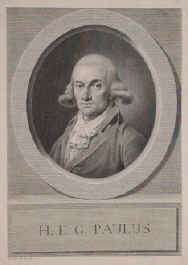Heinrich Paulus
| Heinrich Paulus | |
|---|---|
 Heinrich Paulus. | |
| Born |
1 September 1761 Leonberg, Württemberg |
| Died |
10 August 1851 (aged 89) Heidelberg, Baden |
|
Theological work | |
| Main interests | Natural explanations for the biblical miracles |
Heinrich Eberhard Gottlob Paulus (1 September 1761 – 10 August 1851) was a German theologian and critic of the Bible. He is known as a rationalist who offered natural explanations for the biblical miracles of Jesus.
Paulus was a professor of theology and oriental languages at the University of Jena (1789–1803), then professor at the University of Würzburg (1803–1807). He spent time in Bamberg, Nürnberg and Ansbach before becoming professor of exegesis and church history at the University of Heidelberg (1811–44), where he was instrumental in hiring Hegel in 1816. His theological rationalism greatly influenced Hegel's own theology.
As a Lutheran in the Age of Enlightenment, he firmly believed in the autonomy of the individual and freedom of the individual (through reason) from the dogma of the church.
Charges of anti-semitism have been levelled at Paulus for his advocacy of assimilation of Jewish people into German culture. In his published pamphlet "The Jewish National Separation: Its Origin, Consequences, and the Means of its Correction." he argued that "Jews were a nation apart, and would remain so as long as they were committed to their religion, whose basic intent and purpose were to preserve them in that condition. In a country that was not their own, therefore, Jews could not claim more than the bare protection of their lives and possessions. They might certainly not claim political equality."
Published works
- 1802, Philologisch-kritischer und historischer Kommentar über das neue Testament (Philological criticism and historical commentary on the New Testament)
- 1828, Das Leben Jesu als Grundlage einer reinen Geschichte des Urchristentums (The life of Jesus as the basis of a purely historical account of early Christianity; 2 vols.)
See also
- Deism
- David Friedrich Strauss
- Johann Gottlieb Fichte (Paulus was one of Fichte's "staunchest supporters and allies")[1]
- Swoon hypothesis (Scheintod (apparent death) in Paulus' words)
- Friedrich Wilhelm Joseph Schelling
References
- ↑ Daniel Breazeale (ed.), Fichte: Early Philosophical Writings, Cornell University Press, 1993, p. 424.
External links
- List of works by and about Paulus (in German)
- H.E.G. Paulus Opposes the Emancipation of the Jews in Baden (1831)
|